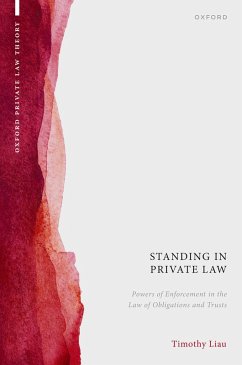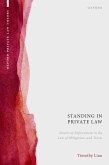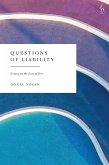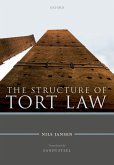Standing in Private Law: Powers of Enforcement in the Law of Obligations and Trusts develops the idea that we should attend more to 'standing', conceived as a power to hold another accountable before a court as a distinct private law concept. Prominent lawyers have claimed that private law does not have or need standing rules, yet this seems implausible. If private law is obligation-imposing, we need rules about who can sue on these obligations to hold their bearers accountable. This book argues that a reason why standing has been relatively overlooked and under-conceptualized, receiving meagre attention from private lawyers, is because it has been obscured from plain sight: it has been swallowed up by the more dominant and capacious concept of a 'right'. However, standing is a distinct and separable private law concept that can and should be distinguished more clearly from 'right'. Doing so is necessary for the continued rational development of private law doctrine. It is also necessary for a deeper theoretical understanding of standing's significance, and its place within the remedial apparatus of private law. This book argues that an implicit standing rule exists across the law of obligations. It examines its justifiability, and the justifiability of exceptions to the rule. It also shows how and why recognising standing's distinctiveness can help us to interpret, develop, and resolve debates within different areas of private law, including the laws of contract, torts, unjust enrichments, and relatedly, the law of trusts.
Dieser Download kann aus rechtlichen Gründen nur mit Rechnungsadresse in A, B, BG, CY, CZ, D, DK, EW, E, FIN, F, GR, HR, H, IRL, I, LT, L, LR, M, NL, PL, P, R, S, SLO, SK ausgeliefert werden.









